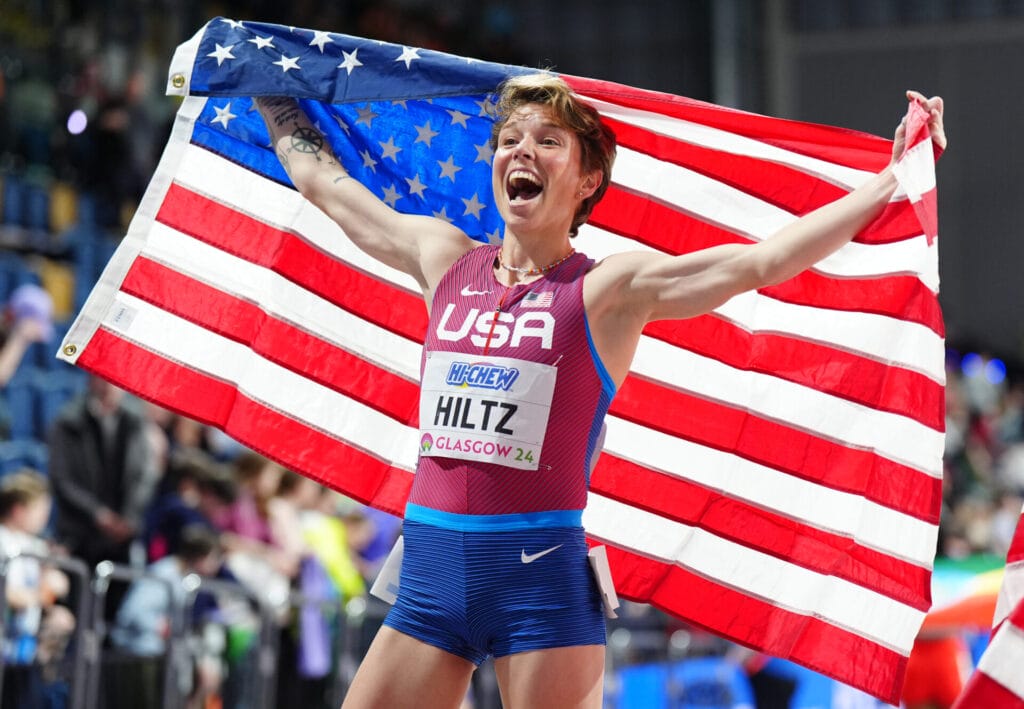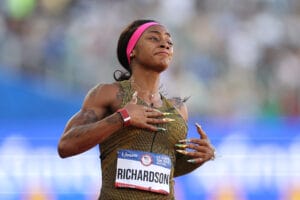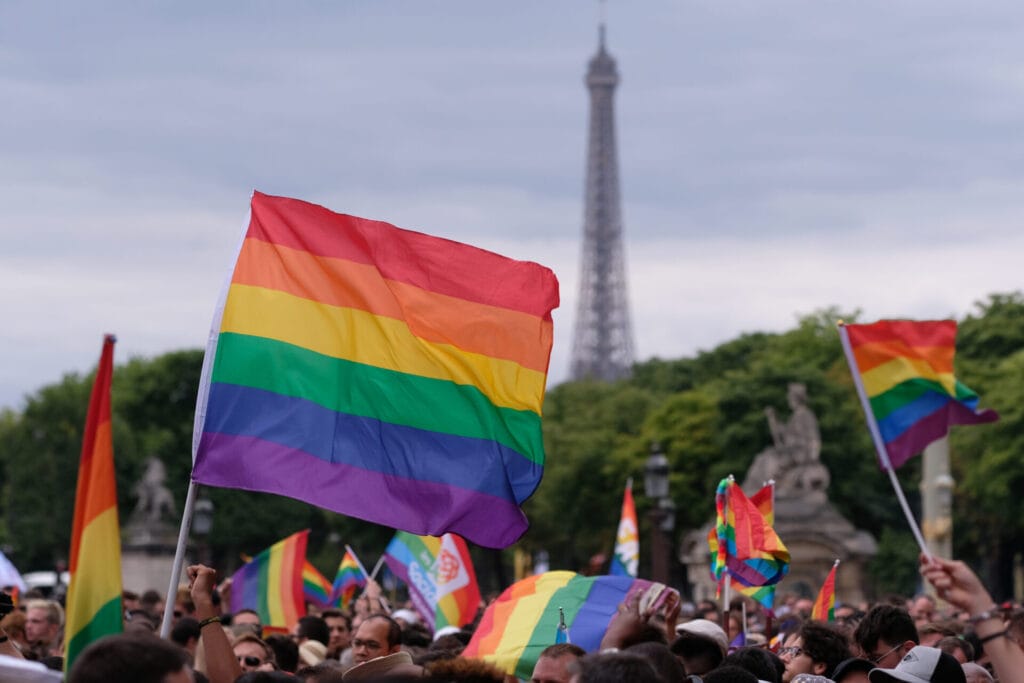The Paris 2024 Olympic and Paralympic Games are upon us and GLAAD is gearing up for what will be the most-watched sporting events placing out LGBTQ athletes on a global stage, with a promise for the Games to be the most innovative, most sustainable, and most inclusive yet.
This year, the Olympics are scheduled to take place from July 26th to August 11th, followed by the Paralympics from August 28th to September 8th. While the vast majority of events will take place in Paris, France, events such as sailing and surfing will extend beyond the city’s limits and are set to occur in Marseille and Teahupo’o, Tahiti respectively.

Games Wide Open
To concretize its goals of accessibility and inclusivity, Paris 2024 has named “Games Wide Open” as the theme for the Olympic and Paralympic Games. In line with the theme, the Paris Olympics and Paralympics will feature full gender parity between men and women. This sets a precedent for future Games and makes history as the first Olympics in which there will be an equal number of men and women competing.
Reaffirming its commitment to keeping the “Games Wide Open” and to the fight against discrimination, the Games will host the Pride House. Led by Fier-Play in collaboration with Paris 2024, the Pride House will serve as an “identifiable, safe and welcoming place for LGBTIQ+ fans, athletes, and allies” the Olympics. This year, the Pride House will be a barge located at the heart of the Games at Rosa Bonheur sur Seine. The venue is free, open to the public, and will host a variety of sporting, festive, cultural and educational activities throughout the duration of the Games.
Those interested in experiencing the Olympic Games in an LGBTQ-friendly environment, and learn more about topics and issues relating to the LGBTQ community can visit the Pride House and various popups in Paris during the Games.
Tracking Out LGBTQ Olympians
According to OutSports, the Olympics will include over 150 out athletes going for the gold with at least 24 countries, including the Refugee Team, represented by at least one publicly out athlete across 32 sports.
Once again, The United States has the most out athletes at the Olympics, with 28, about a fifth of all the attendees on the list. Team USA is followed in the number of out LGBTQ athletes by Brazil (22), Australia (17), Great Britain (10), and Germany (9).
“These athletes are a testament to the tremendous progress the LGBTQ community has made, in sports and society at large, in many parts of the world,” said Outsports co-founder Jim Buzinski in a press release.

Buzinski acknowledges, however, that the battle is not yet won.
In many countries participating in the Games, just walking down the street, or holding a Pride parade, as an LGBTQ person is illegal.
“We hope our list of athletes on Team LGBTQ inspires people across the world, including in countries where being out is extremely difficult, to keep going,” Buzinski added.
GLAAD’s Paris 2024 Olympic and Paralympic Guide
To ensure comprehensive coverage of the Games, GLAAD has partnered with Athlete Ally and Pride House France to produce the GLAAD’s 2024 LGBTQ Paris Olympic and Paralympic Guide. The guide aims to enhance and equip journalists, creators and storytellers covering LGBTQ athletes to tell their stories fairly and accurtely. The GLAAD guide also raises awareness about topics and issues pertaining to the LGBTQ community globally.
GLAAD’s 2024 LGBTQ Paris Olympics and Paralympic Guide also includes LGBTQ language, terminology and use-cases relevant to reporting on LGBTQ athletes at this year’s games in Paris as well as a comprehensive profile on more than a dozen out LGBTQ athletes to watch.
GLAAD’s 2024 LGBTQ Paris Olympics and Paralympic Guide covers a wide range of topics including the history of LGBTQ athletes at the Olympics and Paralympics, Olympic Policies on Transgender Athletes, and a list of LGBTQ Olympic Hopefuls to Watch–such as the world’s fastest woman, Sha’Carri Richardson; or the first out LGBTQ Olympic sport climber, Cambell Harrison.

While the Guide undoubtedly celebrates the accomplishments of LGBTQ athletes, it also calls attention to the various threats LGBTQ people encounter around the world. According to the International Lesbian, Gay, Bisexual, Trans and Intersex Association (ILGA), as of July 9, 2024, there are 61 countries around the world that “criminalize consensual same-sex sexual acts,” seven of which institute the death penalty in various circumstances. These laws put LGBTQ people in harm’s way as they face threats of state-sponsored violence. In the context of the Olympics–whether perpetrated by the state, sports federations, or individuals–anti-LGBTQ policies and rhetoric have severely hindered athletes’ ability to compete authentically.
Recently, sports federations such as the World Athletics Association, which governs Track and Field, changed its eligibility requirements affecting transgender and intersex athletes. As a result, athletes such as two-time Olympic gold medalist Caster Semenya and NCAA Division II champion CeCe Telfer are barred from representing their respective countries at the Olympics. Similar policies have also been enacted by the Union Cycliste Internationale (UCI) and World Aquatics.
Access GLAAD’s 2024 LGBTQ Paris Olympics and Paralympic Guide here.
Continuing Coverage
GLAAD encourages reporters, creators and those covering the Olympics in any way to look supplement coverage with GLAAD’s 2024 Olympic and Paralympic Guide, available in both English and French.
GLAAD will continue to update GLAAD.org with profiles highlighting various LGBTQ athletes with the latest on their progress and celebrate any medals or victories LGBTQ athletes bring home.
How to Watch
A preview of the Opening Ceremony of the 2024 Paris Olympics will air on NBC at 12 p.m. ET on Friday, July 26. Live coverage of the Opening Ceremony begins at 1:30 p.m. ET, and with an enhanced encore in primetime at 7:30 p.m. ET/MT/PT that same day. The Ceremony is expected to last over three hours.
See the official NBC Olympics schedule here.
GLAAD’s 2024 Olympics and Paralympic Guide was created in collaboration with Athlete Ally and Pride House France, and produced by the GLAAD Media Institute, GLAAD’s training, research and consulting division. Learn more at GLAAD.org/Institute and support GLAAD’s work here.













